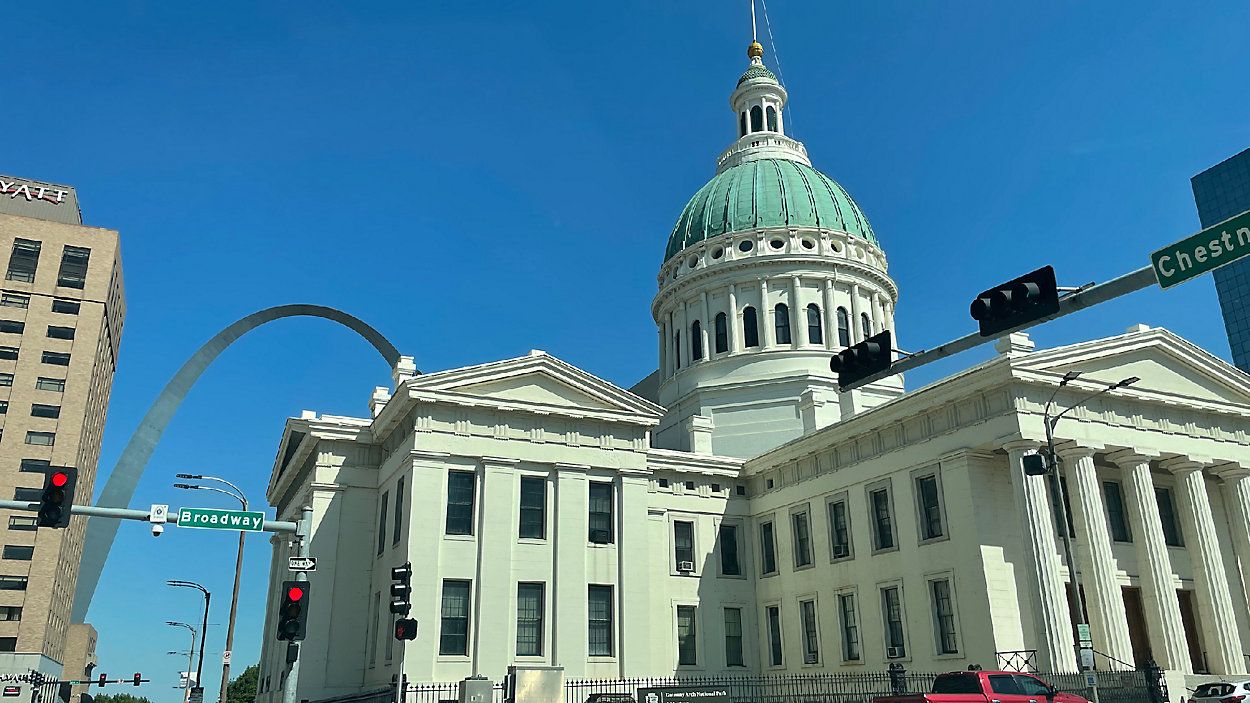KIRKWOOD, Mo–Gov. Mike Parson had just wrapped up a pep rally where he presented a proclamation to Kirkwood High School for being recognized as a national “Blue Ribbon” school based on student achievement. As he toured the building Thursday he was peppered with questions from student journalists who asked him about his visit, school security, and security beyond the school’s walls.
“I was wondering how you feel about the safety of St. Louis as a whole?,” one student asked.
"I think there are issues up here. I think we all know that....when you say St. Louis as a whole, I think we got to be careful about that because sometimes we make it sound like the whole St. Louis area is just a very high crime rates and things of that nature, it's not the whole area," Parson said. "State's gotta do their part, city's gotta do their part and the county. We've got to slow that down, we got to stop it. I mean you cannot let violent offenders be out there all the time taking people's lives. I mean, I've worked homicides as a law enforcement officer for many years and there's nothing more final than that. And so we got to do everything we can to help and assist but we gotta do a better job because what we're doing right now's not working."
Excluding justifiable homicide cases, there have been 150 homicides in the city of St. Louis through September 29, 2022, compared to 146 in 2021. Mayor Tishaura Jones' administration has championed a public safety strategy that incorporates social workers so that police can focus on violent crime and has taken what her administration has called "data-driven deployment strategies" to address crime.
Parson has not backed away from years of criticism of St. Louis Circuit Attorney Kim Gardner over what he believes has been a lack of prosecutions of violent criminals in the city. Earlier this summer, Parson and the Missouri Chamber of Commerce and Industry presented a study showing roughly 75% of the state’s business leaders think crime negatively impacts the state’s economy, with 80 % of business leaders in St. Louis area surveyed showing concern that crime hurts the state’s competitiveness.
The Chamber is expected to use its legislative influence in the next session to boost law enforcement hiring, funding for law enforcement technology, and address substance abuse and mental health challenges, among other areas.
St. Charles County Executive Steve Ehlmann this week laid out his own legislative wish-list for the governor and state lawmakers when it comes to addressing crime in the St. Louis area.
In a guest editorial in the St. Louis Business Journal, Ehlmann, a former Republican lawmaker in the Missouri House and Senate, urged lawmakers to debate whether St. Louis should retain local control of the St. Louis Metropolitan Police Department to “motivate the city to address the crime problem in its own way before the legislature could take any final action.” He also suggested a change to state law that requires the city of St. Louis to give permission for the Highway Patrol to work in the city.
He also pondered a constitutional amendment asking voters to combine the St. Louis city and county circuits, under a single elected circuit attorney.
Representatives for Gardner and St. Louis County Prosecuting Attorney Wesley Bell had no comment on the proposals. Spectrum News did not hear back from representatives for St. Louis County Executive Sam Page or St. Louis Mayor Tishaura Jones. Jones, a Gardner ally, tweeted her reaction to the column.
It’s unclear if Ehlmann has the ear of state lawmakers in moving any of the ideas forward legislatively. The Missouri Chamber of Commerce and Industry did not return a message asking if it would back them. Legislation for the next session starting in January can’t be pre-filed until December.
Reacting generally to Ehlmann’s proposals, Gov. Parson told Spectrum News it’s up to local leaders to step forward.
“At the end of the day, the city and county are going to have to take care of business here and do something about this crime rate that keeps going up. You look at the homicide rate in our cities, especially St. Louis and the environment that's in, we gotta figure out a way to change that, but we're here to partner, we're not here to take over and we're not going to take over the city or the county,” he said.



